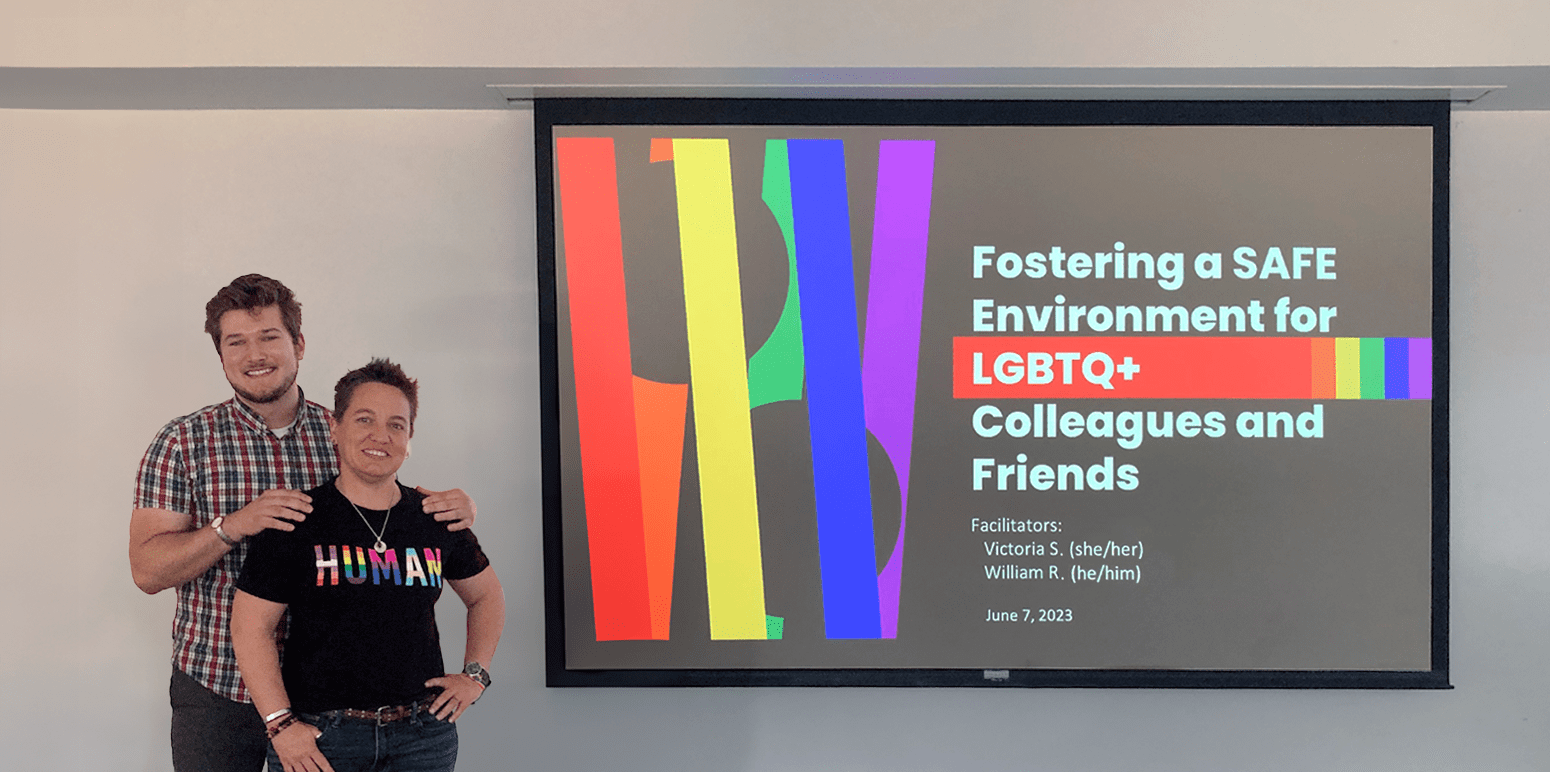
Fostering a Safe Environment for LGBTQIA+ Colleagues and Friends
To celebrate PRIDE month, two of our Peppers came together and courageously presented information on how members of our Pepper Family, as allies, can help foster a safe environment for LGBTQIA+ in the work place and in society as a whole.
The presenters spoke their personal truths about ‘Coming OUT’ and what it has been like growing up and entering the workforce as LGBTQIA+ identifying. These 2 vastly different stories differ drastically and were an emotional rollercoaster ride to hear – from the heartbreaking to the encouraging; from the hardships of being involuntarily OUT’d by a faith community pastor to the overwhelming love and support by family, friends and community.
After level setting and explaining key terms and definitions, the presenters spoke about just some of the challenges that are faced by the LGBTQIA+ community. These included education, employment, healthcare, and mental health. The stats were staggering.
Education
From elementary school through the college years, LGBTQIA+ students have long felt invisible, underserved, and/or misunderstood. Their lack of acceptance by their peers and teachers ignites their need to hide their authentic selves and portray being someone they are not. This constant fear hinders their full engagement in learning and excelling far more than their cisgendered straight friends. According to WestEd, less than 50% of transgender, gay, lesbian, and bisexual students feel safe at school.
Employment
In the United States, over 8 million workers identify as LGBTQIA+, and extensive documentation highlights the employment discrimination and harassment they face, impacting their health, well-being, job commitment, and satisfaction. According to the Williams Institute School of Law 50% of LGBTQIA+ employees are not out to their employers or supervisors.
Healthcare
Despite various states legal protections, health care discrimination against LGBTQIA+ individuals remain a significant concern. Instances range from harassment and humiliation to denial of care by hospitals, pharmacists, and doctors. A comprehensive survey by the Center for American Progress (CAP) revealed that 29% of transgender people and 8% of LGBQIA+ people claimed a health care provider refused to see them because of their actual or perceived sexual orientation.
Mental Health
The LGBTQIA+ community disproportionately deals with mental illness and thoughts of suicide. According to the National Alliance on Mental Illness and Mental Health America, the annual prevalence of mental illness among lesbian, gay, or bisexual Adults in the U.S. is 50.2%. Mental Health concerns range from anxiety, depression, PTSD, CPSTD, etc. that commonly leads to isolation, substance abuse, and attempted suicide.
Talk the Talk & Walk the Walk
So what do you do if someone comes out to you??? Here are some tips from theSafeZoneProject.
DON’T say this:
-
Say “I always knew,” or downplay the significance of their sharing with you
-
Go tell everyone about your “new trans friend”
-
Ask probing personal questions or cross personal barriers you wouldn’t have crossed before
Please DO this instead:
-
Ask them how you can best support them
-
Check-in on how confidential this is – do other people know? Is this a secret?
-
Know that this is a huge sign of trust
-
Be the same (or better) friend you were yesterday
Remember that coming out is not a once and done kind of situation. LGBTQIA+ folks come out over and over and over again in each new setting, new office, new team, new company. People may be ‘out’ in some spaces, ‘in’ in other spaces, ‘out’ to friends and ‘in’ to family and co-workers. Remember that is can be very dangerous and unhealthy to ‘OUT’ someone or to force them to come out, regardless of your intentions – it’s not your story to tell.
Here are some ways to be a good LGBTQIA+ ally and foster an environment where others can feel safe, it is crucial to be accepting, take action, and have humility:
-
Be accepting. Use the chosen name and pronouns that are given to you during an introduction.
-
Stand up for what’s right. Confront both interpersonal (a coworker making an offensive comment) and systemic biases (a workplace dress code that discriminates against certain individuals).
-
Be humble. Listen more than you speak in discussions of LGBTQIA+ issues. Truly learn from members of the community instead of pretending to make a good impression.
Eleven Peppers understand the importance of inclusivity, diversity, and social responsibility. We are allies to the entire LGBTQIA+ community and work hard to make sure that the issues listed above are addressed and action is taken to make each of our Peppers feel happy and safe to come to work.
